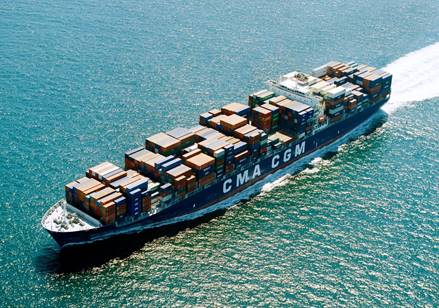
IKEA Transport & Logistics Services, CMA CGM, the GoodShipping Program and the Port of Rotterdam have announced they will cooperate in a first of its kind partnership to test and scale the use of sustainable marine bio-fuel oil.
The test will commence with a landmark bunkering of the marine bio-fuel oil on a CMA CGM container vessel on March 19th, representing a major step towards the decarbonization of ocean freight.
The test is being facilitated by the GoodShipping Program, a sustainable initiative dedicated to decarbonizing ocean freight, and is the latest step in the scaling of low carbon marine bio-fuel oils for wider commercial use within the maritime industry.
Extensive research and development
The sustainable marine bio-fuel oil has been developed by GoodFuels, the leading provider of sustainable marine biofuels to the global commercial shipping fleet, after undergoing three years of intensive testing with marine engine manufacturers. The second generation bio-fuel oil is completely derived from forest residues and waste oil products, expected to deliver 80-90% well-to-propeller CO2 reduction versus fossil equivalents, and virtually eliminates sulphur oxide (SOx) emissions - all without any requirement for engine modifications.
A major step to the decarbonization of ocean freight
Through this collaboration, IKEA Transport & Logistics Services, CMA CGM and the GoodShipping Program – with the support of the Port of Rotterdam – aim to demonstrate the scalability, sustainability and technical compliance of sustainable marine bio-fuel oil, and thereby spur the wider continued development of realistic options to curb greenhouse gas and sulphur oxide emissions from shipping.
This announcement comes at a time when the shipping sector is at a crossroads, with owners and operators required to switch to low sulphur fuels by 2020. The industry also faces impending International Maritime Organization (IMO) Greenhouse Gas (GHG) reduction requirements, including an objective to reduce average carbon intensity from shipping – the amount of carbon emitted for each unit of transport – by at least 40% by 2030, and 70% by 2050.
Elisabeth Munck af Rosenschöld, Head of Sustainability, IKEA Global Transport & Logistics Services, said: “Through our pilot we want to show that the means for decarbonization in terms of alternative fuels are available. We have a responsibility to do our part to reduce the impact of our ocean freight. Through our participation we send a signal to our customers and the ocean industry on our commitment to decarbonize. Only through collaboration can we achieve rapid, necessary change. With a successful pilot completed, our intention is to put the equivalent of at least all our containers out of Rotterdam on biofuel.”
Dirk Kronemeijer, CEO, The GoodShipping Program said: “The aim of our program has always been not only to reduce carbon emissions from shipping, but to show that the means to accelerate the energy transition are already available for the sector to grasp. Together we send a very clear message: sustainable biofuels are ready today, and we can meet the pathways laid out by the IMO in a manner that is attractive to major cargo owners such as IKEA.”
Xavier Leclercq, Vice President, CMA Ships, said: “In a few days, we will be testing second-generation biofuel in one of CMA CGM’s vessels for the first time. Having an HFO-equivalent solution in biofuel oil available with no engineering or operational changes required to our vessel offers a safe, manageable and innovative opportunity to facilitate shipping’s wider transition to new fuel solutions.”
Allard Castelein, CEO, Port of Rotterdam commented: The Port of Rotterdam considers this initiative by IKEA, CMA CGM and GoodShipping to be a strong rallying cry to the shipping industry. This bunkering shows that decarbonization of sea trade is well achievable. It’s clear that shippers play an important role in decarbonizing the industry. In Rotterdam the necessary infrastructure is available. Besides that, to support these kind of initiatives, we have just started a four year period during which we have $5.6 million to spend on stimulating specific projects to reduce carbon dioxide emissions from the global shipping industry.



